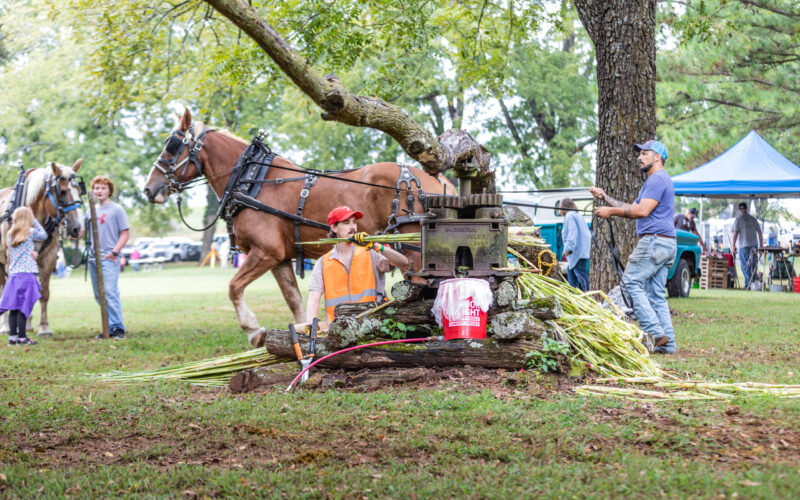BECCA MARTIN-BROWN
bmartin@nwaonline.com
Cane Hill might, at first inspection, look like just a wide spot on Arkansas 45 south and west of Fayetteville.
There’s a quaint little museum building and adjacent art gallery right on the main street; Jenkins Grocery, which boasts an old-fashioned telephone booth but no store; a two-story brick schoolhouse up on the hill; and a variety of homes from the 1800s in various stages of resurrection.
What Vanessa McKuin and Amanda Cothren see when they come to work every day is one of the great hidden treasures of Northwest Arkansas — the place where European settlers from Kentucky and Tennessee first arrived in 1827; the place where the Cane Hill School opened in 1835 and went on to become the second four-year chartered college in the state of Arkansas; the home of the first coeducational college and the first public library in the state; and a time capsule with 16 sites already listed on the National Register of Historic Places.
“We want the past to be present in Cane Hill without it being a place frozen in time,” said McKuin, executive director of Historic Cane Hill, the nonprofit dedicated to the preservation of the tiny town’s historically significant structures. “The vision is for Historic Cane Cane Hill to be a vibrant community and a place to experience history, Ozark culture, the arts and nature.”
What that means, she said, is bringing Cane Hill back to “resemble the significant role it played in the 1870s, when it was at its height in terms of being a center of education, craft and activity for Northwest Arkansas.”
Once a year — this year on Sept. 21 — the Cane Hill Harvest Festival attracts as many as 3,000 visitors for a country breakfast, live music, an Arts and Eats Market, sorghum pressing demonstrations, craft demonstrations, tours of historic buildings and a quilt show.
“The festival was started by volunteers as a fundraiser to help maintain the Cane Hill College building and has grown into a celebration of both this community and Ozark culture,” said Amanda Cothren, who is Historic Cane Hill’s program and events coordinator. “I hope [visitors] take advantage of the opportunity to explore traditions like sorghum making, fiber arts, and blacksmithing — all becoming lost arts.
“I hope they observe how traditional meets modern in our Arts and Eats Market. I hope they get a chance to explore the grounds, from our wildflower meadow — with our state co-champion bur oak tree! — to our Jordan Creek trails, and that they have a chance to reconnect with nature and each other.”
Beyond the idyllic present, where trails for hiking historians wind through the site, McKuin and Cothren also see hopes and dreams for the future.
“In the next 10 years, we hope to have more amenities for residents and guests, including overnight accommodations, expanded event facilities and gathering spaces where people can get a cup of coffee or tea and a bite to eat,” McKuin enumerated.
“We will continue to grow and introduce conveniences and attractions to entice the public to visit, but I think our focus will and should continue to include the preservation of natural spaces,” added Cothren. “Likely, you’ll see more biking trails, a bed and breakfast, a coffee shop, a restaurant or eatery, and perhaps even a store of some sort. But when visitors make the drive in from Highway 45, I still want them to have the physical sensation that they are entering somewhere special — a community that will be more than 200 years old.
“If the Zeb and Eunice Edmiston house becomes the coffee shop, as it is slated to, guests will be receiving their new-age coffee in a 162-year-old structure. That’s not something you get to experience every day.”
“We see Historic Cane Hill’s work as a bridge from the past to the future,” added McKuin. “In the present, it’s immensely gratifying to play a part in preserving important places in a beautiful community.”
__
FAQ
Cane Hill Harvest Festival
WHEN — Kicks off with a country breakfast from 7-10 a.m. Sept. 21 with live music, an “Arts and Eats” market, sorghum pressing and more from 8 a.m. to 3:30 p.m.
WHERE — On the grounds of Cane Hill College, 14219 College Road (Washington County 4762), Cane Hill
COST — $5 adults, kids 12 and younger free; bundle with breakfast for $12 adults, $5 kids
INFO — historiccanehillar.org/festival/



